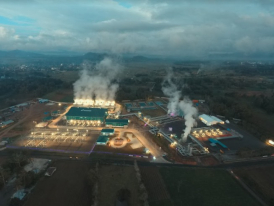Greenpeace criticizes Prabowo administration, over climate environmental policies
Greenpeace Indonesia has raised concerns over the President Prabowo Subianto administration's commitment to addressing climate and environmental issues, citing its lack of concrete action despite public statements at international forums.
Leonard Simanjuntak, Country Director of Greenpeace Indonesia, highlighted the government's plan to achieve self-sufficiency in food and energy by designating Merauke, Papua, as a National Strategic Project (PSN).
The initiative, he warned, poses a significant risk to Indonesia's climate goals as it could lead to the deforestation of 3 million hectares of forest in the region.
“Indonesia's climate targets cannot be met solely through energy transitions; preserving Papua's forests and other critical ecosystems is essential,” Leonard said during a discussion in Jakarta on Thursday, December 19, 2024.
The PSN projects, particularly in energy and agriculture − such as palm oil cultivation − are likely to create significant challenges for Indonesia’s efforts to meet its commitments under the Paris Agreement.
“We could face some of the most serious deforestation issues, especially in Southern Papua,” Leonard said.
Sekar Banjaran Aji, Forest Campaigner for Greenpeace Indonesia, also expressed concerns about the injustice faced by local communities due to the government’s approach in Merauke.
She emphasized that the current development strategies undermine efforts to protect forests and meet biodiversity goals.
“With such policies, even the simplest conservation targets, such as maintaining biodiversity, will remain unachievable,” Sekar remarked.
Environmental and economic costs
A recent report by the Center of Economics and Law Studies (Celios) reveals that the Merauke Food Estate project could result in additional carbon emissions of 782.45 million tons of CO2, equivalent to an economic loss of approximately Rp47.73 trillion (US$2.9 billion).
The large-scale deforestation required for the project could increase Indonesia's global carbon emissions contribution from 1.96 percent to between 3.96 percent and 4.96 percent.
Greenpeace Indonesia has urged the government to reconsider projects that compromise environmental sustainability, emphasizing that the preservation of forests is vital for both national and global climate goals.
Tag
Already have an account? Sign In
-
Start reading
Freemium
-
Monthly Subscription
30% OFF$26.03
$37.19/MonthCancel anytime
This offer is open to all new subscribers!
Subscribe now -
Yearly Subscription
33% OFF$228.13
$340.5/YearCancel anytime
This offer is open to all new subscribers!
Subscribe now






